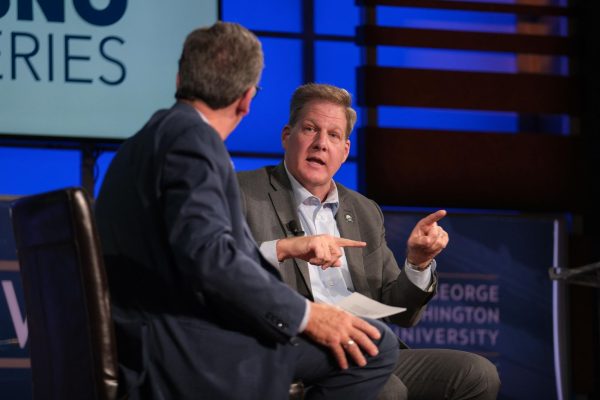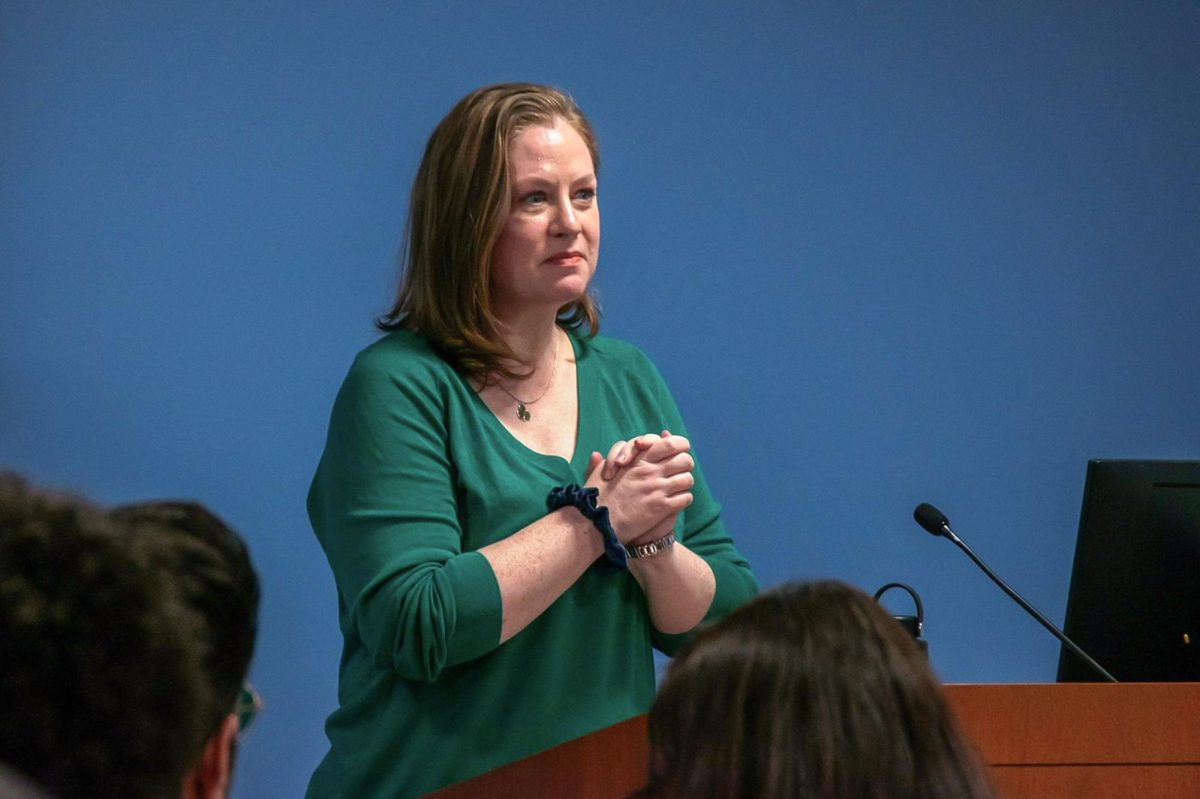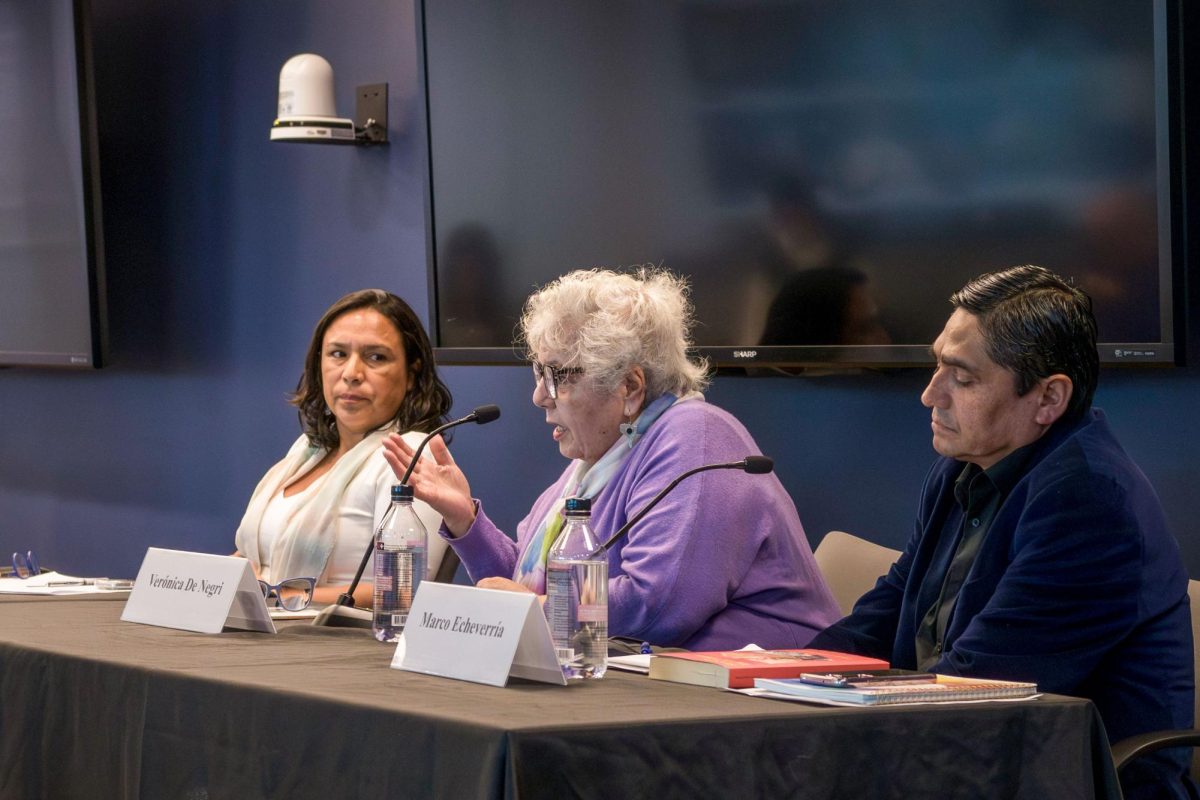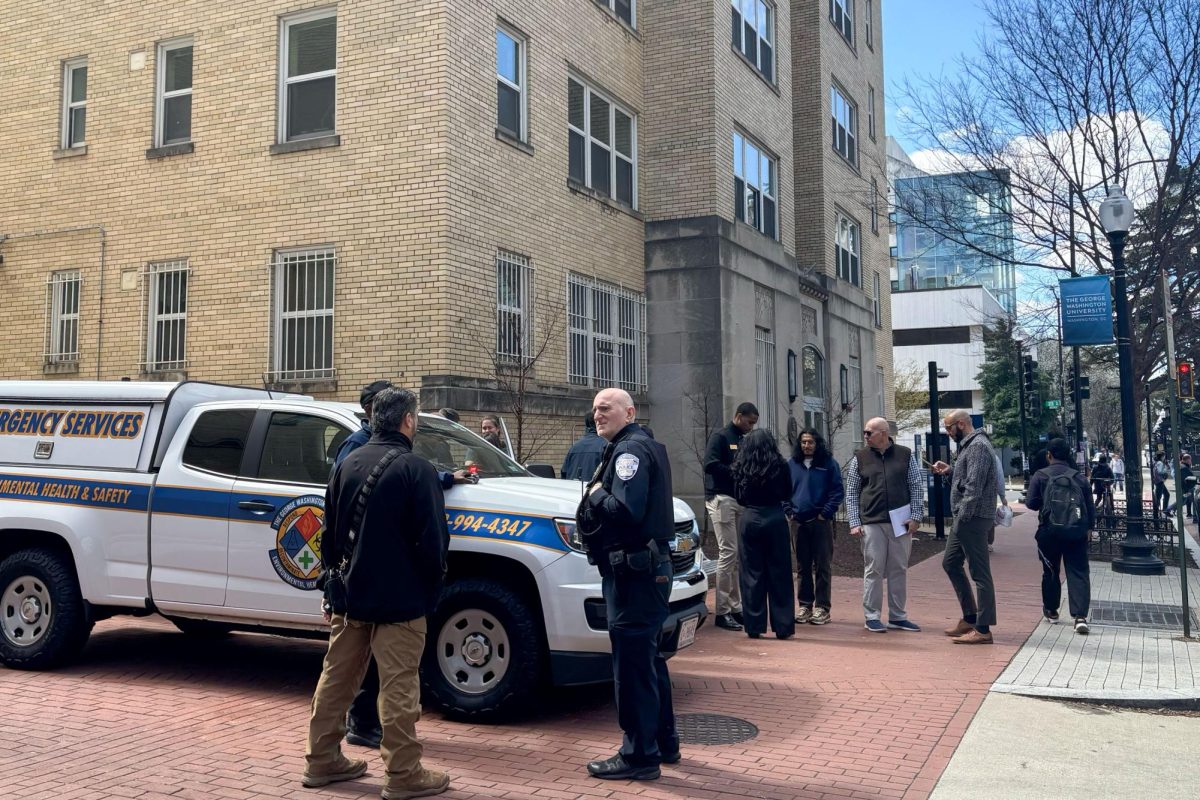Former New Hampshire Gov. Chris Sununu spoke about the importance of local government and defended the early actions of President Trump’s second term at the School of Media & Public Affairs on Tuesday.
Sununu, a Republican who was first elected in 2016 and served until January, said he approves of the Trump administration’s efforts to eliminate government inefficiency and said an empowered local government increases citizen’s civic participation and decreases partisan polarization. The governor sat for a conversation with Frank Sesno, a professor of media and public affairs, who said his Sesno Series team had struggled to find a Republican willing to speak with him for an event until Sununu agreed “willingly and exuberantly.”
Provost Chris Bracey welcomed the audience before ceding the stage to Sesno, who said the conversation would be “thought provoking” and that in the decades he spent reporting in Washington, he has never seen a political moment like today’s. He said America’s severe political polarization makes the planned conversation even more relevant.
“We are polarized, we’re divided, for sure. It makes what we’re doing here at the University and in this conversation even more important, to come together, to listen respectfully, to learn and to lean in and to think about where we are and where we’re going,” Sesno said.
Sununu said although political division has reached new highs in recent decades, he has not lost faith in government institutions. Sununu said he liked how the Trump administration’s policies have returned power and control to state and local governments.
“One of the reasons I actually like what’s happening, what Trump is doing in some ways, it’s a decentralizing of government that’s a very positive thing, that’s empowering to more citizens,” Sununu said.
Sununu said New Hampshire’s high civic engagement can be attributed to its localized government and the fact that the only statewide tax, property tax, is decided at the town level along with a host of other laws and regulations. He said localization prevents politics from getting too partisan and increases participation in government because even when there are policy disagreements, people get along as neighbors and citizens at the end of the day.
“The local control aspects of what we do empower transparency and participation like nowhere else, which keep it independent,” Sununu said.

Sununu then said Trump and his Department of Government Efficiency, a division of the executive branch, will have to work with Congress to get “most” of what they aim to accomplish as they work on rooting out fraud and inefficiency in the government.
He said DOGE’s efforts — to find inefficiency, fraud and waste within federal agencies — are only necessary because Congress has failed to pass a balanced and debt-free budget for decades and that Trump has taken it upon himself to fix the problem.
Sesno said when balanced budgets had been passed through Congress during previous administrations there had been deals made within Congress and with the executive branch. He said Trump did not collaborate with Congress on the cost-cutting measures and has pushed the bounds of executive power to accomplish the recommendations of DOGE, like mass firings of the federal workforce.
Sununu said DOGE has acted abruptly regarding its cost cutting actions and that the department is moving “too hard” but not too fast. He said instead of DOGE cutting entire departments, he would have preferred if they re-appropriated funds in a way that helps Americans but maintains the agency.
Sununu added that there is “nothing wrong” with firing federal employees because the government “isn’t here to keep you employed.”
Sesno and Sununu debated if it is hypocritical for Trump to say diversity, equity and inclusion is exclusionary and part of cancel culture while he investigates and fires people who he disagrees with. Sesno said Trump is participating in cancel culture by rooting out people within the government that do not align with his agenda.
“I mean, if we’re gonna talk about cancel culture, we got a cancel culture now like we’ve never had, where people are being fired, where funding is being restricted, where agencies are being shut down, where whole boards are being thrown out,” Sesno said.
Sununu said the mass firings are due to a lack of money to keep the staffers financed, not cancel culture, and said the administration is not exercising the “wokeism” practice of taking action based on being offended.
“What you’re talking about today is we don’t have the money. We don’t have the dollars,” Sununu said. “These are duplicative efforts, and we can do it another way.”
Sesno read a question given to him in advance by University President Ellen Granberg who asked what the benefits are to having “strong” research universities in New Hampshire.
Sununu said Manchester, New Hampshire — which is home to multiple universities — is leading America’s bioregenerative research, the growing of human organs in a lab setting using the intended recipient’s DNA and that the research feeds into businesses that continue the work started by the colleges.
When asked by Sesno where the funding for those projects came from, Sununu said the federal government. The Trump administration took action earlier this month to freeze and alter research funding to universities from the National Institutes of Health.
In a statement last week, Granberg said the freeze is a “serious concern” to the University, which a day later joined a lawsuit challenging Trump’s actions alongside the Association of American Universities.
Sununu said Trump “missed the mark” with the way he messaged the NIH funding cuts. He said Trump has moved to change the amount of money that can be spent on overhead — things like salaries for scientists and materials for the labs — not cut off money to universities.
Sununu said in every other government contract the limit on overhead spending is set somewhere between eight to 12 percent and that these research contracts have it set as high as 50 percent. He said Trump has ordered that only 15 percent of grant money can be spent on overhead, leaving more money for the actual research.
Sununu said the change makes regulations uniform in federal contracts and that the goal of the funding change is to put funds directly toward research. When Sesno posed the possibility that this change will cause labs to close and research to stop due to an inability to buy materials and pay salaries, Sununu said in that case the issue would have to be debated in Congress.
“The goal is to put the money in the research, not in the staff. And I don’t — why would anyone complain with that?” Sununu said. “University might not like it because they can’t hire more staff, but let’s put it in the research that’s actually going to make the country better and heal people.”











